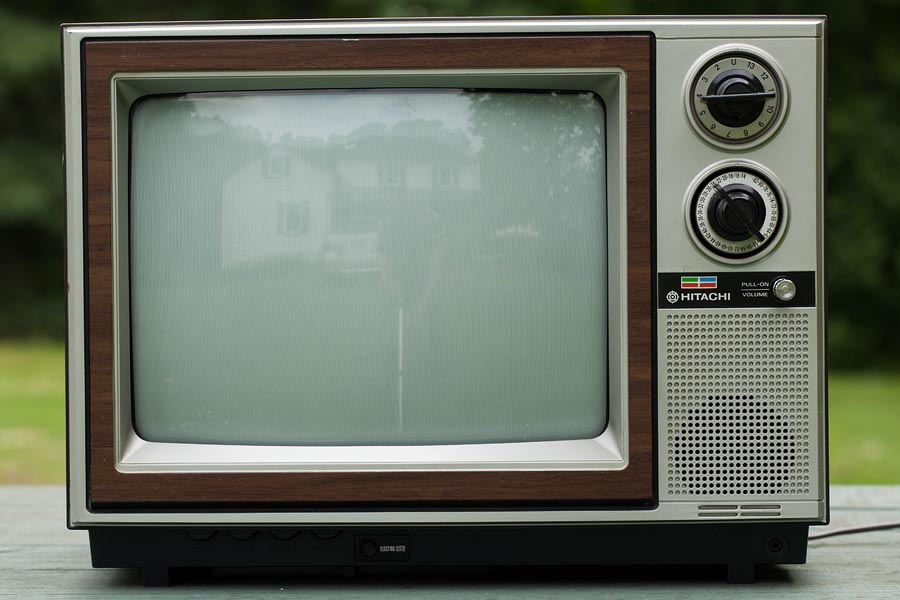
Who else remembers TV sets looking like this? Sans remote control. If you want to change the channel, you had to get up out of your chair. Not all TVs sets could even connect to cable! Just an antenna!
Yes, an eclectic mix of topics, I know.
Greetings from my AF Reserve two-week tour. I’m sitting in my billeting room rather bored right now. The night shift I was scheduled for is canceled, and I had been sleeping mornings so be ready for my night shifts. I now flip back to day shifts; this will be interesting. I woke up this morning at 11:30am! And now I need to be able to go to bed by about midnight.
Anyway, we’ve all been busy at work keeping tabs on Hurricane-now-Superstorm Sandy. When I’m off duty, I have The Weather Channel on, with Twitter, Facebook and Google+ all screaming newsfeeds at me about the storm.
You don’t have to be subscribed to any social media to keep in touch: Go ahead, check it out!
Last night I went to see a couple movies. First I saw Argo, then, out of boredom, I stuck around to see Cloud Atlas. I loved both movies, and maybe I’ll write more about that later.
In both Argo and Cloud Atlas, there is a lot of scenery from the 70s. Particularly in Argo, which also was a time period that I distinctively remember (November 1979 – February 1980). They do a good job trying to convey the cars, fashion and media of the late 70s, which was neat to see, and it triggered my own memories of the daily count during the Iranian Hostage Crisis.
My parents watched ABC World News Tonight, which came on near dinnertime. Peter Jennings, or whoever was the individual who opened the broadcast (for there were multiple anchors back then), would open the nightly news broadcast with the number of days of captivity. A persistent reminder of the hostage crisis for America, who has a habit of following shiny objects bouncing by.
That was the ONLY time I heard any news about the hostage crisis. I’m sure my parents read the newspaper, but I did not at age 6. There was no internet, no 24/7 news, even talk-radio was few and far between.
They had a scene in Argo where Tony Mendez (played by Ben Affleck) is talking on the phone with his son while watching Planet of the Apes, and he has to stand up and walk a couple steps over to the TV set to change the channel. Who remembers that? I sure do!
All through the movie, you see evidence of a society that is NOT tethered to communication. Not only is there the scene of Mendez changing the channel, but another scene caught my attention. Towards the end of the film, someone from the CIA attempts to call the “fake” movie producers sitting in a “fake” office in Los Angeles to alert them of some critical information. They can’t be reached for quite some time because the folks in the office went to get something to eat.
That was the drama – two men weren’t able to answer the phone at the office. There were no cell phones, no Facebook Messenger as alternate means to contact these men.
I thought about that. How we are now fully expected to be easy-to-reach. The Air Force expects it of us by issuing Blackberries to key personnel. Creditors now expect us to use online bill-pay methods (some places charge you a fee for a paper bill!), and hence not require as long a time to make the payment. Travel reservations require a cell phone — either for a plane ticket or a rental car.
How simple times were back then. I’m not even going to go there with the other impacts of everyone having cell phones, Facebook and Twitter — from the radiation concerns to politics driving friendships apart to potential embarrassments when the wrong things is said, or the wrong picture is posted.
Anyway, fast forward now to Hurricane-turned-Superstorm Sandy. You know the lightning speed with which news is traveling now! Check out the number of channels full of 24/7 coverage of the storm, and the Twitter feed, and the emergency managers taking advantage of Facebook and Twitter to get their messages spread quickly.
Not all of the information is true, unfortunately…yet it will still spread wildly. This picture I linked was found out to have been taken in September, but it certainly doesn’t change the intent. No less than a dozen of my Facebook friends had shared that picture.
I guess my point is that too much information might be overwhelming. I certainly am feeling overwhelmed weeding through the multitude of weather data that’s now available at everyones’ fingertips. I found that for this storm, I felt most at-home returning to my roots: the classic 4-panel chart. I felt most comfortable with it when it was on paper, I enjoyed reviewing those charts now.
Who else feels the information overload during these kinds of events?

Recent Comments